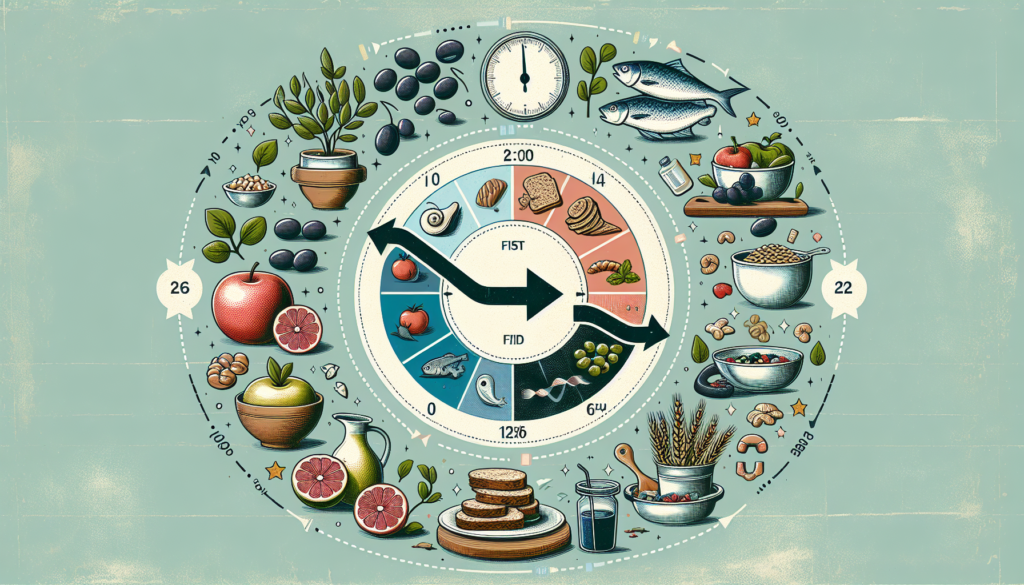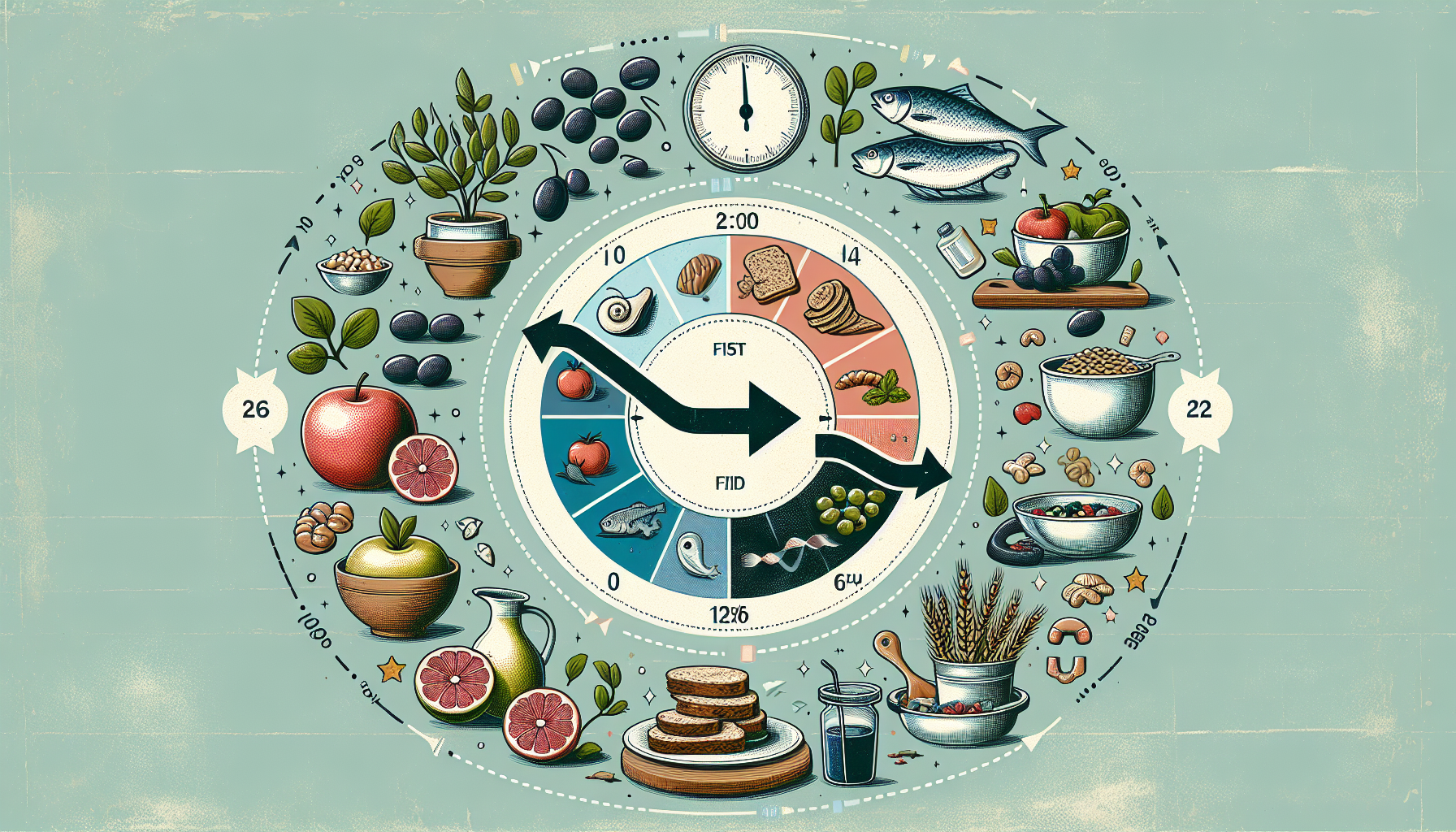Are you curious about how quickly you can shed those extra pounds by following the Mediterranean diet? This article explores the timeline for weight loss on this popular eating plan. From the healthy fats and abundant fruits and vegetables to the moderate inclusion of lean proteins, the Mediterranean diet offers a balanced and sustainable approach to weight loss. With its emphasis on whole foods and mindful eating, find out just how rapidly you can achieve your weight loss goals on this Mediterranean-inspired lifestyle.

Benefits of the Mediterranean Diet for Weight Loss
Overview of the Mediterranean diet
The Mediterranean diet is a way of eating that is based on the traditional foods and cooking styles of countries bordering the Mediterranean Sea, such as Greece, Italy, and Spain. It is known for its emphasis on plant-based foods, such as fruits, vegetables, whole grains, legumes, and nuts, along with moderate amounts of dairy products, fish, and poultry. Red meat and processed foods are limited in this diet. The Mediterranean diet is not only known for its delicious and diverse flavors but also for its potential health benefits, including weight loss.
Weight loss potential of the Mediterranean diet
The Mediterranean diet has gained popularity worldwide due to its potential for promoting weight loss. Numerous studies have shown that following this eating pattern can lead to significant reductions in body weight and waist circumference. The primary reason behind its effectiveness for weight loss is its emphasis on whole, nutrient-dense foods and a balanced ratio of macronutrients.
Factors Affecting Weight Loss on the Mediterranean Diet
Calorie intake
One of the key factors affecting weight loss on the Mediterranean diet is calorie intake. Although the Mediterranean diet does not focus on strict calorie counting, it encourages portion control and mindful eating. By consuming appropriate amounts of the recommended foods, you can create a calorie deficit and promote weight loss.
Level of physical activity
Physical activity plays a vital role in weight loss when combined with the Mediterranean diet. Regular exercise helps to increase calorie expenditure, build lean muscle mass, and improve overall health. Combining the Mediterranean diet with an active lifestyle can enhance weight loss results and promote better body composition.
Individual metabolism
Each person has a unique metabolism, which affects how their body processes and uses energy. Some individuals naturally have a faster metabolism, allowing them to burn calories more efficiently. While the Mediterranean diet can be effective for weight loss, individual differences in metabolism may influence the rate at which weight is lost. It’s important to remember that weight loss is a gradual process and may vary from person to person.
Body composition
Another factor affecting weight loss on the Mediterranean diet is body composition. While weight loss is often the primary goal, focusing solely on the number on the scale may not give a complete picture of progress. The Mediterranean diet, with its emphasis on whole, unprocessed foods, can help improve body composition by reducing body fat and increasing lean muscle mass. This can result in a more toned and healthy physique, even if the number on the scale doesn’t change significantly.
Average Weight Loss on the Mediterranean Diet
Research findings on weight loss
Research studies have consistently demonstrated the effectiveness of the Mediterranean diet in promoting weight loss. Several studies have shown that individuals following the Mediterranean diet can achieve significant weight loss, ranging from 5-10% of their initial body weight within a period of 3-12 months. These results indicate that the Mediterranean diet can lead to sustainable and long-term weight loss when followed consistently.
Timeframes for weight loss
The timeframe for weight loss on the Mediterranean diet can vary depending on several factors, including initial body weight, dietary adherence, and individual metabolism. On average, individuals can expect to lose around 1-2 pounds per week when following the Mediterranean diet and maintaining a calorie deficit. It’s important to remember that slow and steady weight loss is generally more sustainable and healthier than rapid weight loss.
Tips for Successful Weight Loss on the Mediterranean Diet
Following the main principles of the Mediterranean diet
To maximize weight loss potential on the Mediterranean diet, it’s essential to focus on the main principles of the diet. This includes consuming plenty of fruits, vegetables, whole grains, legumes, and healthy fats, such as olive oil and nuts. These foods provide essential nutrients, fiber, and antioxidants while being lower in calories compared to processed and high-fat foods.
Adding variety to your meals
To keep the Mediterranean diet exciting and enjoyable, it’s important to add variety to your meals. Experiment with different fruits, vegetables, whole grains, and lean proteins to keep your taste buds satisfied. Incorporating a wide range of flavors, herbs, and spices can also enhance the overall taste of your meals and prevent boredom.
Paying attention to portion sizes
While the Mediterranean diet promotes the consumption of nutrient-dense foods, it’s still crucial to pay attention to portion sizes. Even healthy foods can contribute to weight gain if consumed in excess. Using smaller plates, measuring your servings, and practicing mindful eating can help you maintain appropriate portion sizes and prevent overeating.
Incorporating physical activity
As mentioned earlier, combining the Mediterranean diet with regular physical activity can greatly enhance weight loss results. Aim for at least 150 minutes of moderate-intensity aerobic activity per week, along with strength training exercises to build muscle and boost metabolism.
Monitoring progress
Tracking your progress is crucial for successful weight loss on the Mediterranean diet. Keep a food journal to record your meals, snacks, and portion sizes. This will help you identify any areas where you may be overindulging or not getting enough nutrients. Additionally, regularly measuring your body weight, waist circumference, and body fat percentage can provide objective feedback on your progress and keep you motivated.
Potential Challenges and Limitations
High reliance on fresh and whole foods
One potential challenge of the Mediterranean diet is the high reliance on fresh and whole foods. While this is a key aspect of the diet’s health benefits, it may require more frequent grocery shopping and meal preparation. It can be challenging for individuals with busy schedules or limited access to fresh ingredients to consistently follow the Mediterranean diet.
Food availability and cost
Another limitation of the Mediterranean diet is the availability and cost of certain foods. Some regions may have limited access to fresh seafood, olive oil, or other traditional Mediterranean ingredients, making it more difficult to adhere to the diet. Additionally, the cost of some Mediterranean diet staples, such as extra virgin olive oil and nuts, can be higher compared to processed, less nutritious alternatives.
Lifestyle adjustments
Successfully adopting the Mediterranean diet for weight loss may require some lifestyle adjustments. This diet encourages the consumption of homemade meals, as opposed to relying on pre-packaged or fast food options. It also promotes social aspects of eating, such as enjoying meals with family and friends. These changes may require planning and coordination, especially if your current lifestyle is centered around convenience foods or eating on the go.
Social and cultural influences
Social and cultural influences can also pose challenges when following the Mediterranean diet for weight loss. Attending social gatherings or dining out may involve temptations and pressure to deviate from the diet. It’s important to communicate your dietary preferences and goals to family, friends, and colleagues and seek their support and understanding.
Precautions and Considerations
Consulting a healthcare professional
Before starting any weight loss program, including the Mediterranean diet, it is recommended to consult a healthcare professional, especially if you have any underlying health conditions or concerns. They can provide personalized guidance and ensure that the diet is appropriate for your specific needs.
Individual dietary needs and restrictions
While the Mediterranean diet is generally considered healthy and suitable for most individuals, it may not be suitable for everyone. If you have specific dietary needs or restrictions, such as food allergies or intolerances, it’s important to make modifications to the diet to accommodate your needs. Consulting with a registered dietitian can provide valuable guidance in tailoring the Mediterranean diet to meet your individual requirements.
Monitoring and managing chronic conditions
If you have any chronic conditions, such as diabetes or cardiovascular disease, it’s important to monitor and manage them while following the Mediterranean diet. The diet’s emphasis on whole foods and healthy fats can often have positive effects on these conditions. However, it’s crucial to work with your healthcare team to ensure that the diet aligns with your specific medical needs and medication regimen.
Conclusion
The Mediterranean diet offers numerous benefits for weight loss, along with promoting overall health and well-being. By focusing on whole, nutrient-dense foods and adopting a balanced approach to eating, you can achieve sustainable weight loss and improve body composition. While there may be challenges and limitations associated with the diet, with proper planning and support, the Mediterranean diet can be a highly effective tool for achieving your weight loss goals. Remember to consult with a healthcare professional before starting any weight loss program and make adjustments to the diet based on your individual needs and preferences. With consistency and dedication, the Mediterranean diet can help you achieve a healthier weight and enjoy the delicious flavors of the Mediterranean region.
